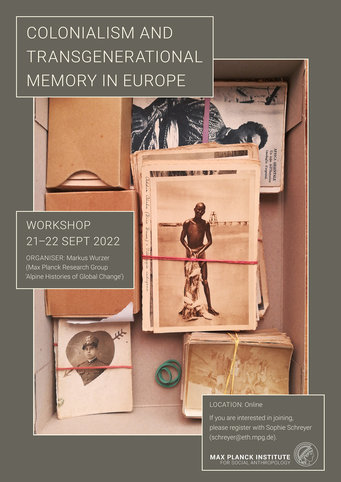Colonial past and the role of family memory
An online workshop entitled “Colonialism and Transgenerational Memory in Europe” will take place on 21 and 22 September at the Max Planck Institute for Social Anthropology (MPI). Historians and anthropologists will address the question of how memories of the colonial past in Europe, passed down in families, play a role in the present. The workshop is organized by Markus Wurzer, a member of the independent MPI research group ‘Alpine Histories of Global Change’ at the MPI. If you are interested in joining, please register with Sophie Schreyer (schreyer@eth.mpg.de).

The sphere of family memory
In recent years, research into colonialism, the memory of it, and its diverse legacies has demonstrated the manifold ways and contexts in which colonial pasts still shape the present. While scholarship has given much attention to colonial remnants, for instance in museums and public spaces, another ‘venue’ of collective memory has rarely been addressed: the sphere of family memory. “The lack of research is even more surprising because transgenerational memory is considered to be one of the most important modes of collective memory, especially when it comes to the transmission and construction of a historical consciousness”, says Markus Wurzer.
The narrative of the “good” colonialist
‘Ordinary’ clerks, soldiers and other colonial actors brought objects like postcards, photographs, and ‘keepsakes’ back home with them to Europe; they also brought stories, which families pass down through the generations. The conception of this workshop is based on two premises. First, this process of passing on family memories significantly shapes the collective imagination of the colonial past. Secondly, family memories are not apolitical: such narratives and objects pass down interpretations of colonial realities that are based in everyday colonial knowledge and support particular imageries such as the idea of ‘white’ superiority. In addition, it is likely that the myth of the ‘good’ colonialist, as circulated in many European societies, has been so powerful because this historical imagination is rooted within the personal level of the family. “Usually, people imagine their relatives who were involved in colonial enterprises as decent and morally upright colonialists and vehemently reject the possibility that they participated in colonial violence”, Wurzer says. “Such violence is always externalised and attributed to other groups, other actors, or even other colonial powers. Therefore, it is high time to address colonialism in transgenerational memory.” This workshop will ask how and what kinds of memories of the colonial past have been passed down in European families whose forbears were involved in processes of de/colonialisation in the nineteenth and twentieth centuries, whether as colonisers or colonised.
